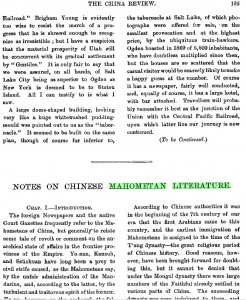Posted March 7, 2016
By Yang Liping
I was checking through the transcript of Diaries and Travel Journals of Ernest Satow (a British diplomat who made his career in China and Japan) the other day when I came across the name of “Thomas Watters”. Satow met and had dinner with him on November 4, 1883 during the former’s holiday leave in London.
T. Watters of the China consular service . . . dined with me at the Oriental Club, and then came to my room in Welbeck Street, to inspect Japse. books on Buddhism. I gave Watters the larger part of my collection.
The paragraph above indicates that Thomas Watters worked for the China consular service. But why did Satow want to show him his collection of Japanese books on Buddhism? This curiosity drove me to conduct a research on him in China From Empire to Republic: Missionary, Sinology, and Literary Periodicals, a digital collection I have been working on since 2014.
I keyed in his name and was surprised to find over 40 hits, most of which relate to two journals: The China Review: Or, Notes and Queries on the Far East and The Chinese Recorder and Missionary Journal. He turned out to be a prolific sinologist who had written extensively on Chinese culture, language, and religions.

In “The Life and Teachings of Lao-Tse” published in Vol XVII of The China Review, German sinologist Georg von der Gabelentz described Watters as the author of “Lao-tze: A Study in Chinese Philosophy.”
Then I delved deeper into this and found “Lao-tze: A Study in Chinese Philosophy” was actually first serialized in the inaugural volume of The Chinese Recorder from June 1868 to February 1869 before being published as a book in 1870 in London by Williams & Norgate. Below is an image extract of Chapter 1 published in No.2, Vol.1 of Chinese Recorder (June 1868).
This serialized publication had won praises from the journal editor, calling it “the ablest and the most correct review of the ‘Old Philosopher’ and his teachings which has yet appeared in the English language.”
Thomas Watters is also the author of “Notes on Chinese Mahometan Literature,” (The China Review, No.3, Vol. I [September 1872]), which could be one of the pioneering scholarly writings on Chinese Muslims ever done by a Western scholar.

Watters’ intense interest in Chinese religions further led to a series of articles on Buddhism (“Buddhism in China”), published in The Chinese Recorder. It’s most probably because of this interest in Buddhism that he and Satow had a dinner meeting in November 1883 and the latter decided to give a large part of his collection of Japanese books on the subject to the former.
China From Empire to Republic: Missionary, Sinology, and Literary Periodicals contains a good collection of sinology and missionary journals. The abundant content therein enabled me to do a meaningful research on Thomas Watters, a lesser-known sinologist–compared to James Legge and Herbert Giles–who had made his mark in the history of Western sinology with his significant research on Chinese religions.
Lastly, Diaries and Travels Journals of Ernest Satow, volume 3 (1883-1898) will be published in May 2016.
[alert-info]
About Yang Liping
Yang Liping switched to Gale digital product development in 2013 after working in editorial handling both higher education and Gale print projects for a number of years at Cengage Learning Asia. He is happy to see the several Asia-related digital collections that he has taken care of benefiting scholars across the world and looks forward to working closely with colleagues at Gale to develop more interesting and meaningful products.
[/alert-info]Air Jordan 1 Retro High OG “Board of Governors” White/Black-Royal Blue




Well, the most important work of Watters is obviously missing: his two-volume commentary on Xuanzang’s Datang Xiyu ji (Record of the Western Regions of the Great Tang). There is another volume on the history of the Chinese language which collects most of what Watters had to say about Chinese language.